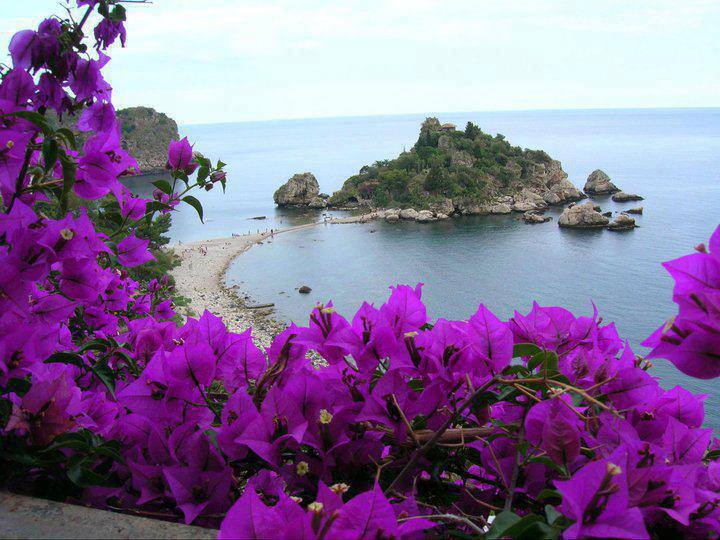
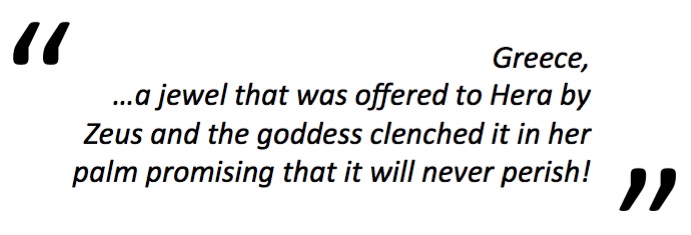
Greece, the southern tip of the Balkans, has the great advantage to be surrounded by three seas. The Aegean in the east, the Ionian in the west and the Mediterranean in the south.
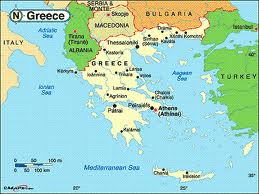 The Greek mainland is characterized by the presence of many massive mountains, enclosing fertile planes with beautiful plateaus at the top. The country’s seas embrace 2.500 islands of which only 165 are populated while the rest are the home to a variety of seabirds that fly peacefully over and around the rocks and caves which are sprayed by the splashing waves. The coastline is 13.676 km long including that of the islands.
The Greek mainland is characterized by the presence of many massive mountains, enclosing fertile planes with beautiful plateaus at the top. The country’s seas embrace 2.500 islands of which only 165 are populated while the rest are the home to a variety of seabirds that fly peacefully over and around the rocks and caves which are sprayed by the splashing waves. The coastline is 13.676 km long including that of the islands.
The coasts are extremely clean and the sea is crystal-clear with shades of a mixture of cyan, blue and green and reflect the color of the sea-bed below and the sky above. Although the sea is usually calm it demands, as the sailors say, respect because sometimes could change into a “monster”.
The island complexes differ in climate and suit the various tastes. Some of them are windy and dry, 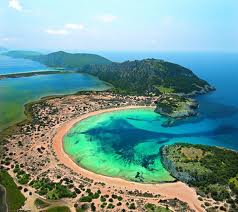 without a worth-mentioning vegetation, where the visitor is “blinded” by the sun, the white of the rocks and the whitewashe of the houses while, at the same time, he is compensated by the coolness the ever-blowing north wind brings (Cyclades). Others are very green, with pine trees reaching down to the colorful pebbles and the golden sand of the beach (Sporades and the North Aegean islands). There are also those which are very hot during the day but refreshingly cool after the sunset, with a dreamy sea colored in all shades of green, cyan and blue (Ionian islands; Dodecanese).
without a worth-mentioning vegetation, where the visitor is “blinded” by the sun, the white of the rocks and the whitewashe of the houses while, at the same time, he is compensated by the coolness the ever-blowing north wind brings (Cyclades). Others are very green, with pine trees reaching down to the colorful pebbles and the golden sand of the beach (Sporades and the North Aegean islands). There are also those which are very hot during the day but refreshingly cool after the sunset, with a dreamy sea colored in all shades of green, cyan and blue (Ionian islands; Dodecanese).
Finally, there is the enchantress Crete combining all the above beauties. With the wild goats (krikri) coming from the mountains down to beaches to cool themselves, with the sound of lyre echoing on the high mountains and the majestic gorges, with the catchy Cretan dances (rizetikos and pentozale) and with the famous Cretan raki drink (similar to arrack) whose smell is enough to intoxicate you.
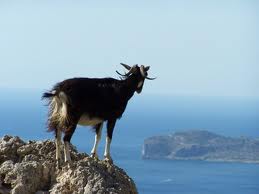 In Greece there are many rivers and underground waters, which irrigate the few but fertile plains and pastures
In Greece there are many rivers and underground waters, which irrigate the few but fertile plains and pastures
Greece’s climate is particularly pleasant, without extreme weather, with warm summer and mild winter.
Spring and autumn are pleasant seasons, with the former smoothly introducing the summer and the latter the winter.
The variety of vegetation is impressive and, during spring, nature is fragrant with the scent of the lemon, the orange and the almond trees as well as of the wild flowers, while the variety of vegetation and colors is beyond description.
The flowers that cover the hillsides and the mountain slopes with green, yellow, red, orange and purple colors make up a wonderful, unique carpet.
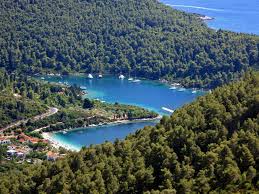 The variety of aromatic and medicinal plants of Mount Parnon in Lacedaemon and of Psiloritis in Crete cannot be found in any other place on Earth.
The variety of aromatic and medicinal plants of Mount Parnon in Lacedaemon and of Psiloritis in Crete cannot be found in any other place on Earth.
All the above geographical and climatic characteristics, with the lovely limitless blue of the sea, the green of the vegetation and the glare of the sun, created ideal conditions for the development of a civilization going back hundreds of thousands of years. This is Greece, the most valuable jewel that Zeus gave to Hera.
Today the country has around 11 million residents who speak Greek and are Orthodox Christians at a percentage of about 90%.
Almost as many Greeks are dispersed throughout the rest of the world. Those are the Greeks of the “diaspora” (dispersion), who are a tremendous force of “ambassadors” for their country, wherever theyare. They are the calm strength of Greece and, if necessary, will be at her side with the first call.

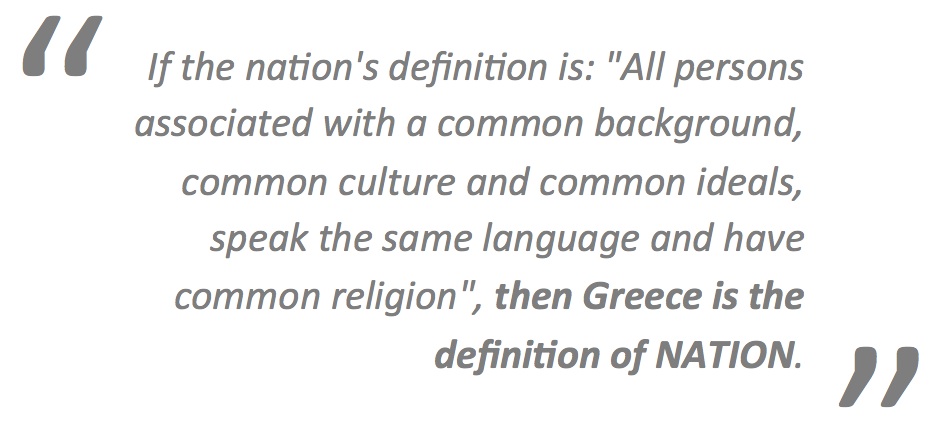

The Greeks are proud, free and hospitable people, with great kindness. They rejoice when they see foreign visitors to have a nice time in their place, while in some areas, such as Crete, the hospitality is a distinguishing characteristic.
They are entertained easily, with simple things and without programming. In a tavern a feast may occur from nothing; a feast with singing and dancing until the morning hours.
The unsurpassed Anthony Quinn in “Zorba the Greek” is not portraying, in essence, the real Giorgis Zorbas (c. 1867–1941), a restless, unsatisfied, intractable Greek from Kolindros, Pieria on whom Kazantzakis based his fictional character. It is the Greek manliness that he “paints”, with amazing acting ability and ease. I would say that, in his acting, the actor was almost transformed to a Greek.
The effect of the sun and the sea is evident in the “explosive” temperament and the psycho-synthesis of Greeks.


The struggles for freedom and independence filled her historic journey. As Greece has always been an ‘attractive bride’ she was conquered numerous times by invaders who arrived here by land and sea.
Even in the calmest periods of world history, Greece had problems with claims and conquest attitudes against her.
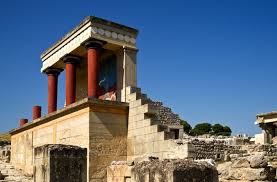 A glorious period in the history of this small country is the one between the 19th and the 4th century BC.
A glorious period in the history of this small country is the one between the 19th and the 4th century BC.
That is the one that started with the first palaces that were built by King Minos in Crete (1900 BC) and ended with the death of Alexander the Great (323 BC).
In that period, the first civilizations of Europe developed in the Aegean and in the land “washed’ by it: The Cycladic civilization which preceded and developed in a circular cluster of islands around the sacred island of Delos, the Minoan (1900 BC) with the construction of the Minos palaces on Knossos, (located in Crete, near the contemporary town of Heraklion) and later the Mycenaean (1600 BC – 1000 BC). Essentially, the Cycladic, the Cretan and the Greek civilization developed in parallel.
From the 8th century BC begins a period of explosive development of letters, arts, intellect and culture, cultivated in the new shaping of the area, where the city-states grow with a variety of regimes and 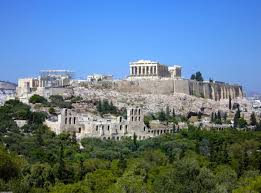 administrative structures. The city-State of Athens played the leading part in the introduction and development of democracy and gave the prototype of democratic regime which has been irevered all over the world for many centuries until today. This does not mean that cities such as Sparta, Corinth, Thebes, Corfu etc, were lagging behind.
administrative structures. The city-State of Athens played the leading part in the introduction and development of democracy and gave the prototype of democratic regime which has been irevered all over the world for many centuries until today. This does not mean that cities such as Sparta, Corinth, Thebes, Corfu etc, were lagging behind.
Athens extends her influence on the coast of Asia Minor, North Africa, the Baltic Sea, South Italy and wherever else her ships (boats), military or commercial, could reach. A brilliant civilization, that illuminated mankind for centuries, was developed on the coast of Asia Minor.
The Persian whirlwind in order to gush out and conquer Europe had to pass first through Greece.
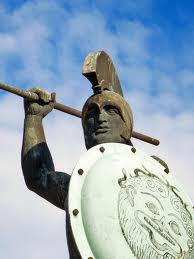 In addition the ‘Great King’ could not tolerate the Greeks standing against his expansionist plans for Europe, to which he considered Greece to be the “gateway”.
In addition the ‘Great King’ could not tolerate the Greeks standing against his expansionist plans for Europe, to which he considered Greece to be the “gateway”.
“Who are these Spartans that would close the road for me?” said Xerxes after visiting ambassadors from Sparta warned him that he could not go through Greece if he didn’t, first, beat the Spartans.
He and his hordes of 800.000 men “felt” the answer to his question quite painfully at Marathon, by the Athenians of Miltiades, at Plataea by Pausanias and his men and in Salamis by Themistocles and his fleet. Finally, he had to lose a very large number of his men and pay respects to the divine 300 Spartan Warriors under King Leonidas at Thermopylae. In the end he returned disgraced to Persia with the remnants of his army and never tried again, leaving Europe unscathed.
Alexander the Great whose campaign reached the Hindu river, closed the chapter ‘Persian fire’ (Tom Holland), which had begun in 480 BC, i.e. forty years before Homer started to write his history
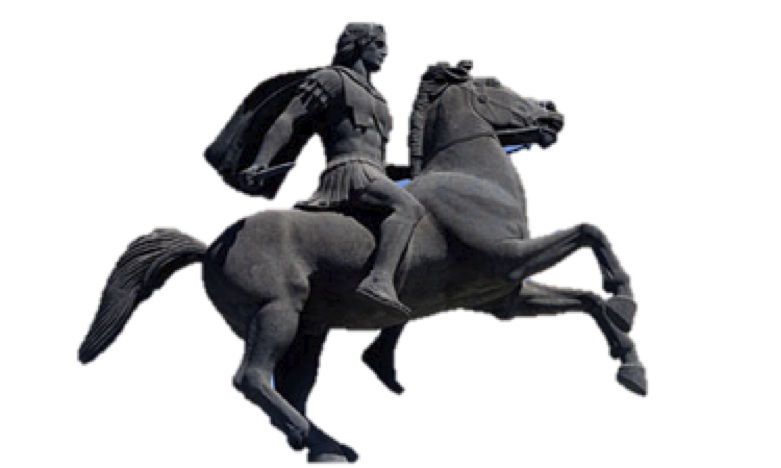 According to Herodotus, Asians always regarded Europe as a place hostile and irreconcilably foreign. So they never ceased to see Greeks as their mortal enemies who closed the road before them towards their ultimate goal, to rule Europe.
According to Herodotus, Asians always regarded Europe as a place hostile and irreconcilably foreign. So they never ceased to see Greeks as their mortal enemies who closed the road before them towards their ultimate goal, to rule Europe.
The omnipotent and irresistible domination of the King of Persia stretched from India to Egypt and the Aegean coast. As a result of these achievements, Xerxes ruled as the absolute ruler of the planet. His war stocks were dazzling and almost unlimited, causing awe to his allies and enemies alike. Europe was not to see an invasion force similar to the one that invaded Greece in 440 BC, until D-Day in 1944, that is the invasion of the Allied Forces in Normandy.
The truth is that at that time the Greeks were divided into small city-states, but considered themselves as a single people, with a common language, religion and customs. These city-states were fighting 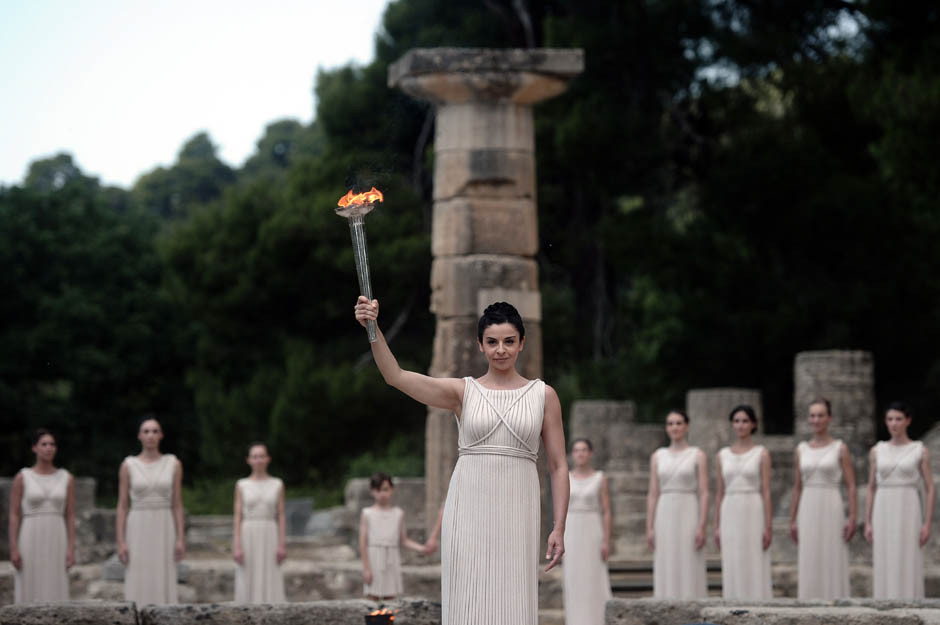 continuously among them for various causes. However they had each year certain days of armistice with the opportunity of sport-games. The most famous armistice was the one every four years with the occasion of the Olympic Games at Olympia, the place where the Olympic flame is lit.
continuously among them for various causes. However they had each year certain days of armistice with the opportunity of sport-games. The most famous armistice was the one every four years with the occasion of the Olympic Games at Olympia, the place where the Olympic flame is lit.
These internal conflicts kept the states constantly battle-ready and this was so, even with the democratic Athens. Of course Sparta surpassed any other state because she had evolved, literally, into a “war machine”. Despite her superiority Persia was defeated and humiliated in Greece, on land and sea.
There is no doubt, and this has been accepted historically for 2,500 years now, that the resistance of the Greeks and the victorious, for them, outcome of the Persian wars, resulted in the definitive salvation of Europe.
John Stuart Mill argued that “the battle of Marathon, as a historical fact, is more important for England than the battle of Hastings”. Hegel, in an extraordinary, for German philosopher, warm tone, declared that this battle had “the whole world hanging by a thread”
If the Persians had conquered Greece, the Athenians could have never developed their, unique, democratic consciousness and diffused it to the far reaches of Europe. Many features of Greek culture would have disappeared and the legacy that transfused in Europe via Rome and Byzantium (330 AD) would have been insignificant or negligible.
The West, not only would have failed in the first fight to survive and to stay independent, but it is doubtful whether it could have ever existed as an entity, if the Greeks have given in to the invader Xerxes.
It is reasonable therefore for the history of the Persian wars to be considered as a fundamental myth of European civilization: as an archetype of freedom, triumph over slavery and democratic virtue against the indolent despotism.
Hoards of Asians, drawn into battle with the threat of the whip, a Spartan King, Leonidas, determined to win or die and an exemplary sacrifice, as he and his three hundred men perished in a suicide mission, constitute a historical event that ‘contained it all’.
In the early 16th century the great French essayist Montaigne claimed that, “Although other battles that the Greeks gave were the most brilliant victories that ever saw sunlight, their combined glory could never be compared with the glorious defeat of King Leonidas and his men in the pass of Thermopylae.”
Two and a half centuries later, Lord Byron, watching Greece languishing as a province of the Turkish Sultan, wrote the most inspiring call to arms:
“… Earth! Render back from out thy breast
A remnant of our Spartan dead!
Of the three hundred grant but three,
to make a new Thermopylae. … ”
(Lord Byron; The isles of Greece)
When William Golding visited the Thermopylae, in the early 1960s, he wondered why he felt so excited despite the fact that Sparta was in essence an authoritarian, brutal and boring city. Let us read his explanation:
“I came to myself in a great stillness, to find that I was standing by the little mound. This is the mound of Leonidas, with its dust and rank grass, its flowers and lizards, its stones, scruffy laurels and hot gusts of wind. I knew now that something real happened here. It is not just that the human spirit reacts directly and beyond all argument to a story of sacrifice and courage, as a wine glass must vibrate to the sound of a violin. It is also because, way back and at the hundredth remove, that company stood right in the line of history. A little of Leonidas lies in the fact that I can go where I like and write what I like. He contributed to set us free…” (William Golding; the Hot Gates)
For 400 years, from 1453 with the fall of Constantinople to the Greek revolution in 1821, Greece stayed constricted by the Ottoman yoke, under particularly harsh conditions. Under terrible trials and unceasing efforts of the oppressors to enforce islamization, the Greeks maintained their national consciousness, language; religion and ideals as well as the memory of their culture, proving once again that Greece would remain a nation and that the Pearl Zeus donated Hera could not be lost even under these tragic circumstances.
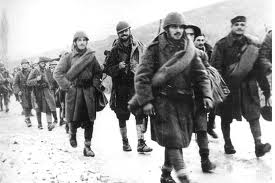 In World War II, small Greece refused collaboration with the axis powers and suffered an unprovoked attack by the then fascist Italy. Italian elite armies were defeated completely by the much fewer Greek forces, in the mountains of Albania (October 1940)
In World War II, small Greece refused collaboration with the axis powers and suffered an unprovoked attack by the then fascist Italy. Italian elite armies were defeated completely by the much fewer Greek forces, in the mountains of Albania (October 1940)
The Italian fascist leader Mussolini, wanting to match Hitler’s successes in other fronts, sacrificed his armies by making a thoughtless attack on the Greek Epirus Mountains in winter time (October 28 1941).
It was his tragic mistake, because he overestimated the capabilities of his large superiority in arms, technology, tanks and air-force, against the determination of the forces of poor Greece.
At that time Mussolini was regarded as the greatest leader in Europe and his army invincible.
The ironic comments and songs that ridiculed him and the reference to the ridiculous spaghetti Italians, although understandable at that time from the Greek propaganda point of view (to boost morale), do not offer any contribution to the historical truth but, rather downgrade the success of Greeks in the months that followed the October 28th, 1940. Hitler then decided to wash away the shame of Mussolini and attacked Greece who was one of the few European countries that resisted the axis powers.
The Greek army lined up at the forts that were constructed along the extensive border with hostile Bulgaria (which coveted Thessaloniki and Serres), although they knew very well that Germans with an appropriate maneuvering will bypass the forts and come from behind, as it was actually done. They knew that it will be so from the historic experience of the battle of Thermopylae and the sea-battle of Salamis, where, in order to confront a much larger army, the defenders narrowed the length of the front.
However, wanting to show that they protect the Greek Macedonia chose the path of sacrifice, as they have done on other occasions in the past. They chose to be defeated militarily than be humiliated as a nation.
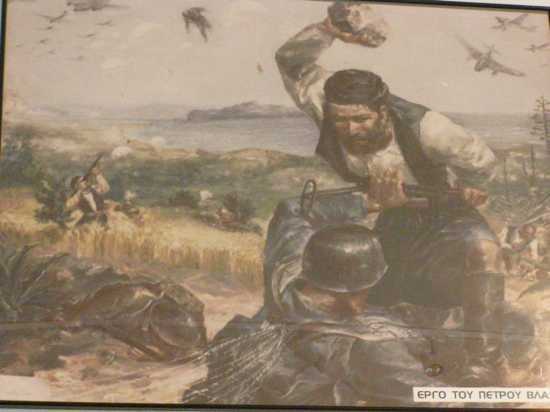 The Third Reich and Hitler personally couldn’t imagine, as he was saying, that Greeks after 23 Centuries would have remained the same three hundred who would decide to sacrifice having fun in order to reap again a “proud defeat.”
The Third Reich and Hitler personally couldn’t imagine, as he was saying, that Greeks after 23 Centuries would have remained the same three hundred who would decide to sacrifice having fun in order to reap again a “proud defeat.”
The German paratroopers had already gotten a taste of the Greeks in the battle of Crete, where they encountered clandestine people armed with pickaxes and shovels and fighting with their ‘teeth and nails”, so to say.
The Cretans paid for this heroism with executions without trial under the pretext that they were a clandestine army and therefore not subjected to the rules of a regular war. Three thousand men were executed under this pretext.
Then, while the country was under occupation, the Greeks developed their national resistance hitting 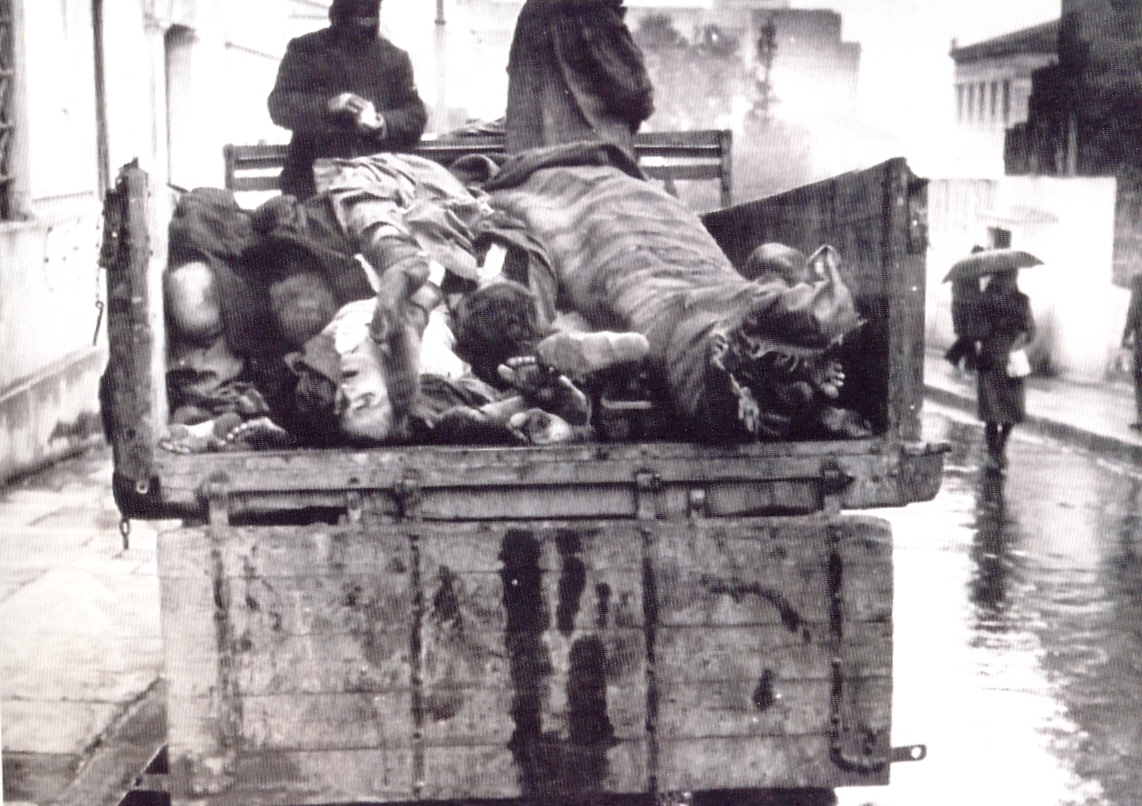 the occupier until the final victory of the Allied troops. The Greek people paid very dearly for their unyielding strength of resistance.
the occupier until the final victory of the Allied troops. The Greek people paid very dearly for their unyielding strength of resistance.
The country was in ruins, looted by the Germans, the Bulgarians and the Italians. 300,000 Greeks died only from starvation, according to figures of the International Red Cross, in addition to the thousands who were executed or perished in the fighting and the resistance.
1700 villages were burnt down and all their men and boys were executed. At the end of the war it was estimated that Greece had lost 13% of its young population. Every vestige of life was paralyzed and yet Greece survived again.
The economic devastation, caused by the extinction of every production process, was tremendous. It was worsened by the high cost of maintaining the occupation forces that was inflicted on the country and by the unbearable loan of 3.5 billion dollars that Greece was forced to lend Germany in order to cover this maintenance.

Today, the fierce financial war against Greece threatens even her sovereignty. However she will win this ‘battle’ too.
We will win the battle and ‘come out alive’, because from this small country that taught nations how to strife, the civilization of Europe started.. The cultural fuse of Byzantium (330 AD) formed the basis for its cultural and cultural revival.
The genesis and the essence of the European world cannot be understood, if it is not related to the ancient Greek spirit, to the Roman State traditions and legislation, to Christianity and to the barbarian and thriving blood of peoples of the North.
The ancient Greek spirit gave the younger Western world objective measures of beauty, of good and of truth.
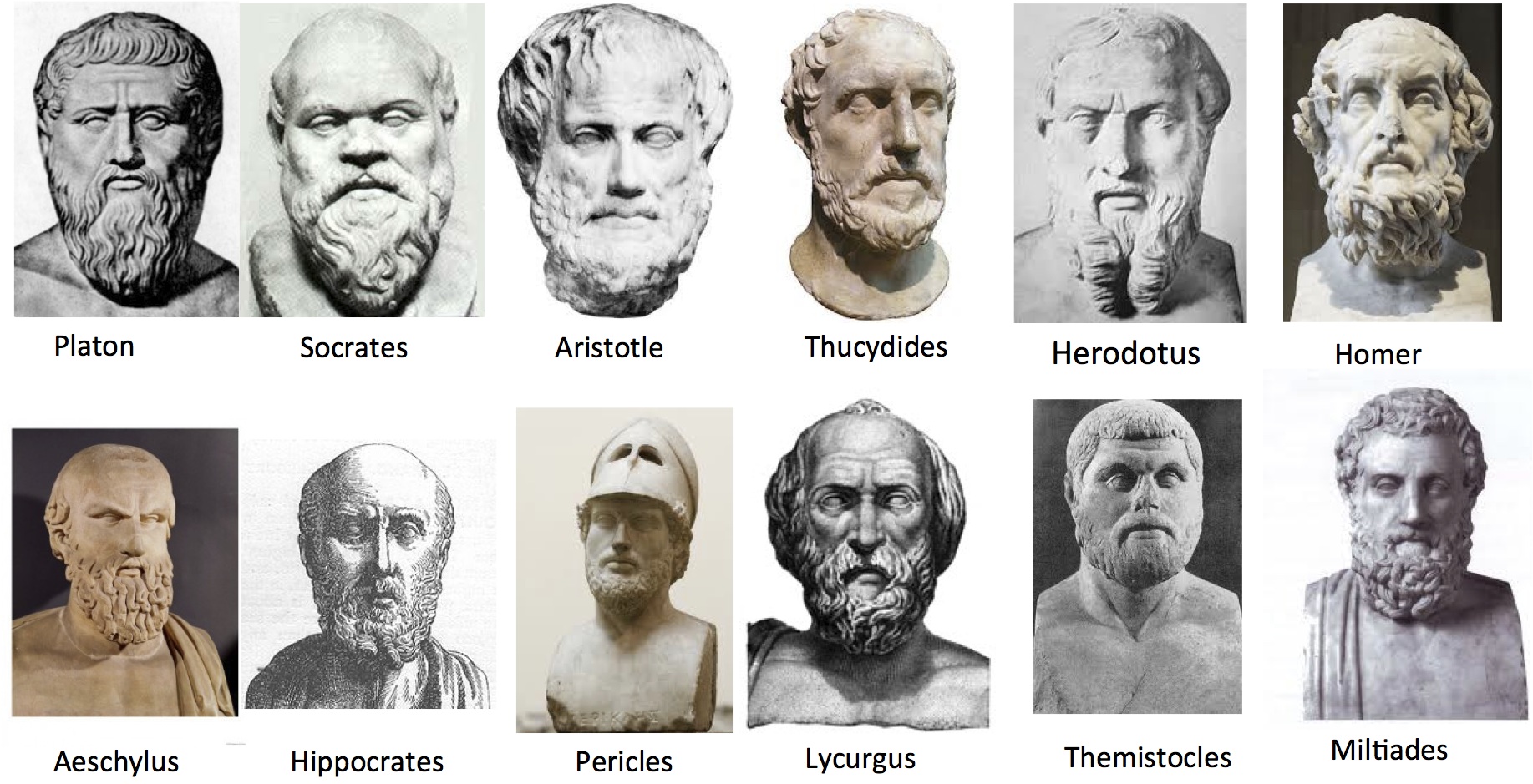 Greece will come out alive from her present struggles. She will be kept alive by her children through the ages: philosophers like Plato, Socrates, Aristotle and Democritus; mathematicians like Pythagoras and Thales; historians like Herodotus and Thucydides; poets like Homer, Aeschylus, Euripides, Sophocles and Aristophanes; physicians like Asclepius and Hippocrates. Of course one should not forget those that consolidated democracy, like Pericles, law and order, like Lycurgus, the protection of Greece and Greeks, like Themistocles, Pausanias, Leonidas, Miltiades and Alexander the Great.
Greece will come out alive from her present struggles. She will be kept alive by her children through the ages: philosophers like Plato, Socrates, Aristotle and Democritus; mathematicians like Pythagoras and Thales; historians like Herodotus and Thucydides; poets like Homer, Aeschylus, Euripides, Sophocles and Aristophanes; physicians like Asclepius and Hippocrates. Of course one should not forget those that consolidated democracy, like Pericles, law and order, like Lycurgus, the protection of Greece and Greeks, like Themistocles, Pausanias, Leonidas, Miltiades and Alexander the Great.
The above is but a small sample of the founders of Greek culture and civilization
Thousands of other scholars, philosophers, poets, mathematicians, sculptors, architects and eminent Kings, generals and heads of city-states, marked with their presence and made the history of this small country a magnificent one.
Also one should not forget, in the sequel, newer poets, artists and literary men like Kornaros, Valaoritis, Palamas, Cavafy, Papadiamantis, Karkavitsas, Melas, Sikelianos, Theotokopoulos (El Greco), Kazantzakis, Varnalis, Seferis, Elytis, Ritsos and many others.
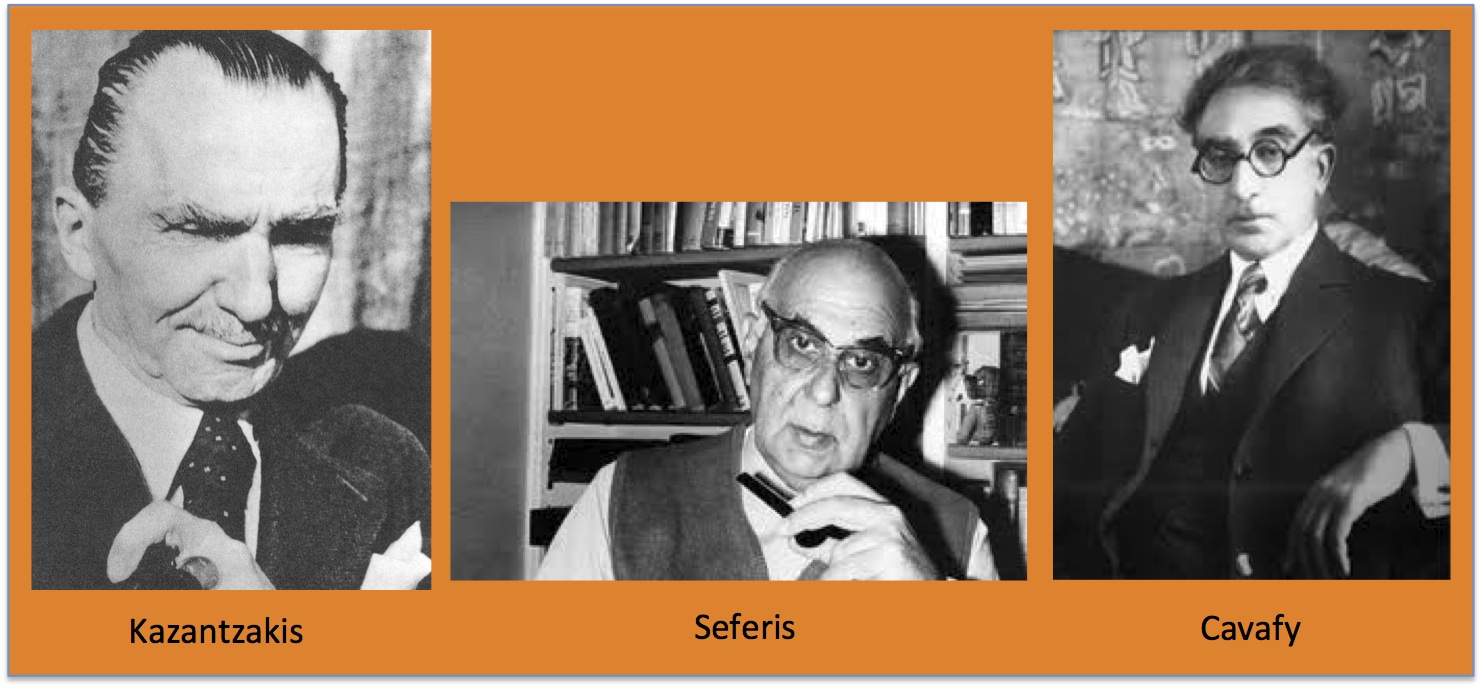
I kept for the end our National poet Dionysios Solomos, the creator of the Greek National Anthem Hymn to Liberty.
I close with his exhortation:
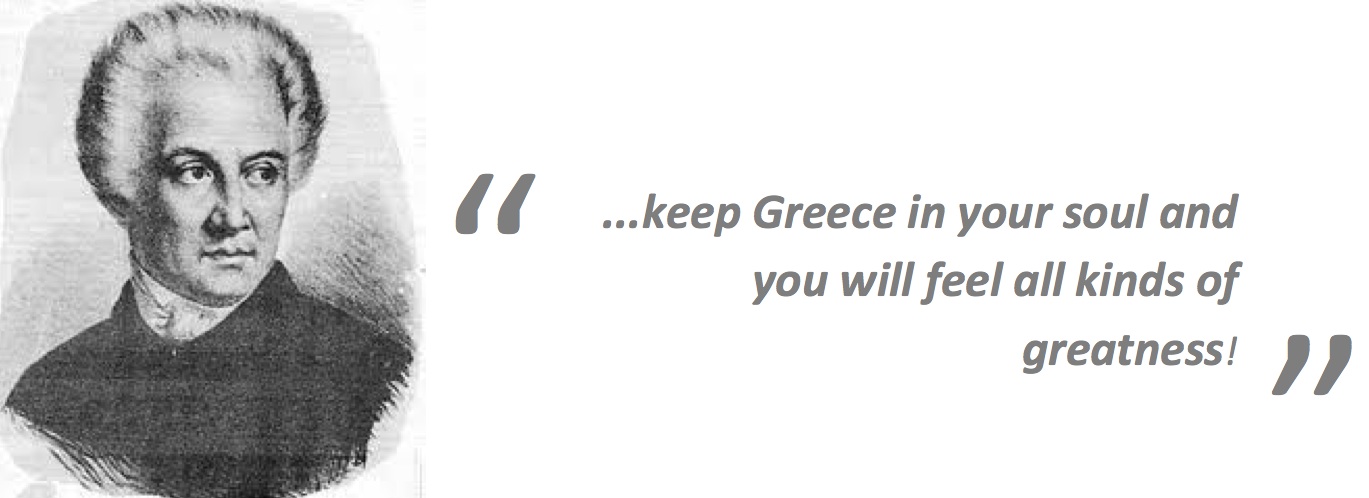
My friends, I am not a historian and I am not a writer. I am a pediatrician that feels proud of his ancestry and cares about his fatherland like, as I believe, all Greeks do.
I wrote this text, with as much strength and knowledge I could have.
The English translation is aimed at freshening up the knowledge of Greeks who live away from home and, especially, at visitors of this website who are not Greeks.
For any errors or omissions I apologize.
Your recommendations are welcome in the column “contact” of the website.
Warm thanks for your time.
Panayiotis Spyridis
Assoc. Prof. Pediatrics
University of Athens
